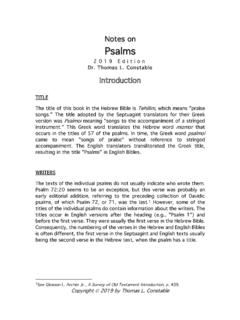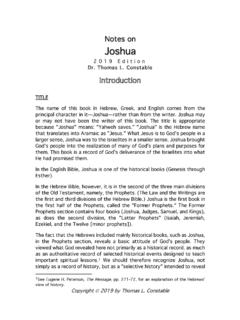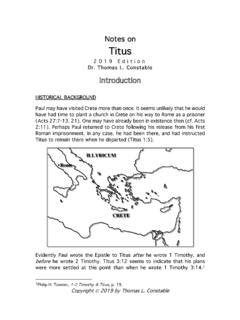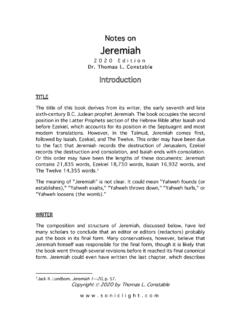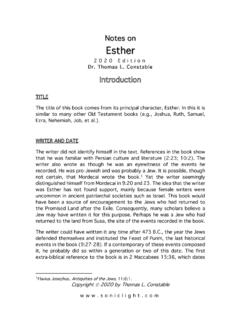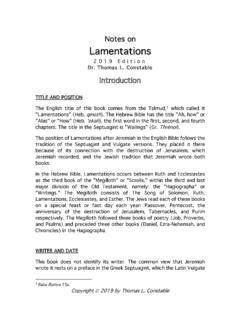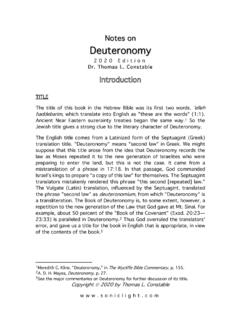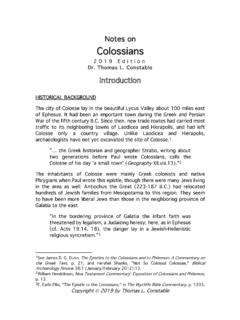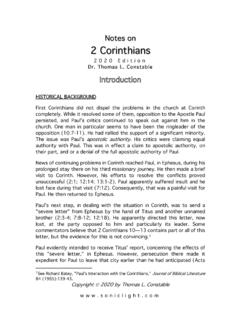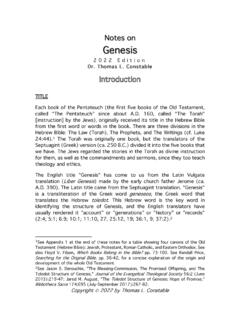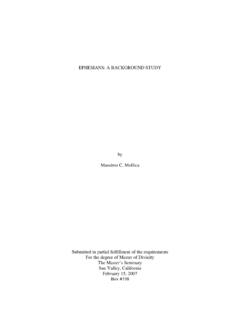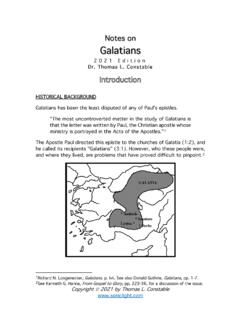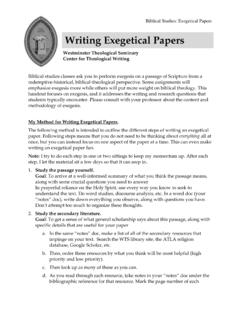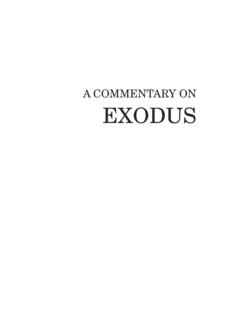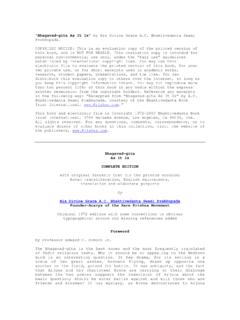Transcription of Notes on Luke - Plano Bible Chapel
1 Copyright 2021 by Thomas L. Constable Notes on Luke 2021 Edition Dr. Thomas L. Constable WRITER Several factors indicate that the writer of this Gospel was the same person who wrote the Book of Acts. First, a man named "Theophilus" was the recipient of both books (Luke 1:3; Acts 1:1). Second, Acts refers to a previous work by the same writer. Third, both books have several common themes, some of which do not receive the same emphasis elsewhere in the New Testament. Fourth, there are general structural and stylistic similarities, including the use of chiasms and the tendency to focus on specific individuals.
2 The writer also acquired his knowledge of Jesus' life and ministry from research rather than from eyewitness observations (Luke 1:1-4). Therefore he was not one of the disciples who traveled with Jesus. The early church identified the writer as Luke (probably shortened from "Lukios" or "Lukanos"1). The heretic Marcion is the earliest witness we have to Luke's authorship (ca. 135). The Muratorian Canon (ca. 180) mentioned Luke as the writer too. It described him as the physician who accompanied Paul on his journey (cf. Acts 16:10-17; 20:5-15; 21:1-18; 27:1 28:16; Col.)
3 4:14; Phile. 24; 2 Tim. 4:11). Irenaeus (ca. 180-185) also believed Luke wrote this Gospel and called him the "inseparable" companion of Jerome wrote that he died at the age of 84 and was never Later church fathers likewise referred to Luke as the writer of this Gospel. 1A. T. Robertson, Word Pictures in the New Testament, 2:ix. 2 Against Heresies, 3:14:1. 3 Matthew Henry, commentary on the Whole Bible , p. 1408. 2 Dr. Constable's Notes on Luke 2021 Edition Luke was evidently a Gentile (cf. Col. 4:10-14). However, some scholars believed that Colossians 4:11 and 14 do not necessarily mean that Luke was a Gentile, and that he may have been a Hellenistic Church tradition identified Antioch of Syria as Luke's hometown,2 but this has not been validated.
4 Philippi also has some traditional J. Sidlow Baxter claimed that we know less about Luke than about any other New Testament DISTINCTIVE FEATURES "Whereas the emphasis in Matthew is on what Jesus said, and in Mark on what Jesus did, here in Luke it is rather on Jesus Himself."5 The main doctrines of systematic theology that Luke stressed were God, Jesus, salvation (especially redemption), the Holy Spirit, angels, and things to come. "Luke is the only synoptic evangelist to use the noun 'salvation' (soteria four times [1:69, 71, 77, 19:9]; soterion twice [2:30; 3:6]) and 'savior' (soter [1:47; 2:11]), and he used the verb 'save' (sodzo) more than any other book in the New Testament (although this is mainly because of Luke's greater length).
5 "6 "In the gospel of Luke the phrase praising God occurs oftener than in all the rest of the New Testament put together."7 There is also much emphasis on the glory of God, prayer, miracles, the divine plan that Jesus fulfilled, Israel, believing, discipleship, forgiveness, and God's Word. About 20 of Jesus' parables are unique to this Gospel. , R. P. Martin, Colossians: The Church's Lord and the Christian's Liberty, p. 146; and John Wenham, "The Identification of Luke," Evangelical Quarterly 63:1 (1991):16. 2J. Norval Geldenhuys, commentary on the Gospel of Luke, pp.
6 21-22. 3 Robertson, 2:x. Cf. John Nolland, Luke 1 9:20, p. xxxix. 4J. Sidlow Baxter, Explore the Book, 5:258. 5 Ibid., 5:232. 6 Donald A. Carson and Douglas J. Moo, An Introduction to the New Testament, p. 220. 7 William Barclay, The Gospel of Luke, p. xvi. 2021 Edition Dr. Constable's Notes on Luke 3 Luke also related certain events in Jesus' life to secular history, and he emphasized Jesus' final trip to Luke stressed Jesus' concern for all people, especially for individuals that Jewish society of His day despised, such as Gentiles, the poor, women, children, and "sinners.
7 " He wrote "the gospel of the underdog."2 No other Gospel presents Jesus having dinner with someone as often as this one does. Luke used the Greek term nomikos, which means "lawyer," rather than the Hebrew term grammateus, meaning "scribe." He emphasized Jesus' practical teachings, such as what He taught about money (cf. chs. 12 and 16). "In terms of its worldview, its theology, and its practical presentation of principles, this Gospel explains how we can serve God better."3 Luke used more medical terms than we find in the writings of Hippocrates, the father of Luke showed interest in purpose, fulfillment, and accomplishment.
8 He documented the joy that resulted from Jesus' saving and healing works. He stressed Jesus' call for people to become His disciples. He portrayed Jesus as dependent on the Holy Spirit and on the Father through prayer. Finally, Luke recorded many examples of Jesus' Muslims respect the Gospels, and probably more Muslims have been brought to faith in Christ through Luke's Gospel than any other, because of its emphases. "Luke's Gospel gives a reader a more comprehensive grasp of the history of the period than the other Gospels. He presented more facts about the earthly life of Jesus than did Matthew, Mark, or John.
9 "6 1 For an excellent summary of Luke's theology, see Darrell L. Bock, "A Theology of Luke-Acts," in A Biblical Theology of the New Testament, pp. 87-166. 2 Barclay, p. xvii. 3 Darrell L. Bock, Luke, p. 26. 4J. Vernon McGee, Thru the Bible with J. Vernon McGee, 4:238. 5 For other characteristic features of Luke's Gospel, see Alfred Plummer, A Critical and exegetical commentary on the Gospel According to St. Luke, pp. xli-lxvii; W. Graham Scroggie, A Guide to the Gospels, pp. 366-81. 6 John A. Martin, "Luke," in The Bible Knowledge commentary : New Testament, p.
10 201. See Arno C. Gaebelein, The Annotated Bible , 3:1:122-23, for a list of 58 events and principal circumstances reported exclusively by Luke. 4 Dr. Constable's Notes on Luke 2021 Edition Luke is the longest book in the New Testament (1,121 verses), Matthew is second (1,071 verses), and Acts is third (1,007 verses). (John has 879 verses, and Mark has 678 verses.) Luke and Acts combined comprise about 27 percent of the Greek New Testament. Furthermore, Luke wrote more verses in the New Testament than anyone else: 2,128 in Luke and Acts. Paul wrote the second largest number of verses (2,032), then John (1,416), then Matthew (1,071), then Mark (678), and finally the lesser "The presentation of the facts is fuller in some respects, but is less topical than Matthew's and is more flowing than Mark's.
